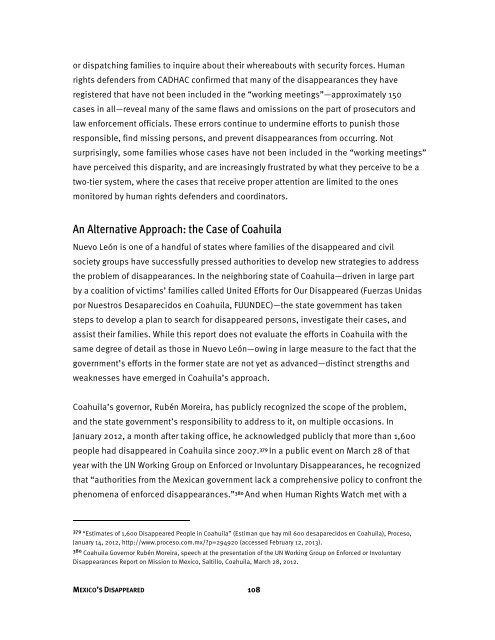Download the full report - Human Rights Watch
Download the full report - Human Rights Watch
Download the full report - Human Rights Watch
You also want an ePaper? Increase the reach of your titles
YUMPU automatically turns print PDFs into web optimized ePapers that Google loves.
or dispatching families to inquire about <strong>the</strong>ir whereabouts with security forces. <strong>Human</strong><br />
rights defenders from CADHAC confirmed that many of <strong>the</strong> disappearances <strong>the</strong>y have<br />
registered that have not been included in <strong>the</strong> “working meetings”—approximately 150<br />
cases in all—reveal many of <strong>the</strong> same flaws and omissions on <strong>the</strong> part of prosecutors and<br />
law enforcement officials. These errors continue to undermine efforts to punish those<br />
responsible, find missing persons, and prevent disappearances from occurring. Not<br />
surprisingly, some families whose cases have not been included in <strong>the</strong> “working meetings”<br />
have perceived this disparity, and are increasingly frustrated by what <strong>the</strong>y perceive to be a<br />
two-tier system, where <strong>the</strong> cases that receive proper attention are limited to <strong>the</strong> ones<br />
monitored by human rights defenders and coordinators.<br />
An Alternative Approach: <strong>the</strong> Case of Coahuila<br />
Nuevo León is one of a handful of states where families of <strong>the</strong> disappeared and civil<br />
society groups have success<strong>full</strong>y pressed authorities to develop new strategies to address<br />
<strong>the</strong> problem of disappearances. In <strong>the</strong> neighboring state of Coahuila—driven in large part<br />
by a coalition of victims’ families called United Efforts for Our Disappeared (Fuerzas Unidas<br />
por Nuestros Desaparecidos en Coahuila, FUUNDEC)—<strong>the</strong> state government has taken<br />
steps to develop a plan to search for disappeared persons, investigate <strong>the</strong>ir cases, and<br />
assist <strong>the</strong>ir families. While this <strong>report</strong> does not evaluate <strong>the</strong> efforts in Coahuila with <strong>the</strong><br />
same degree of detail as those in Nuevo León—owing in large measure to <strong>the</strong> fact that <strong>the</strong><br />
government’s efforts in <strong>the</strong> former state are not yet as advanced—distinct strengths and<br />
weaknesses have emerged in Coahuila’s approach.<br />
Coahuila’s governor, Rubén Moreira, has publicly recognized <strong>the</strong> scope of <strong>the</strong> problem,<br />
and <strong>the</strong> state government’s responsibility to address to it, on multiple occasions. In<br />
January 2012, a month after taking office, he acknowledged publicly that more than 1,600<br />
people had disappeared in Coahuila since 2007. 379 In a public event on March 28 of that<br />
year with <strong>the</strong> UN Working Group on Enforced or Involuntary Disappearances, he recognized<br />
that “authorities from <strong>the</strong> Mexican government lack a comprehensive policy to confront <strong>the</strong><br />
phenomena of enforced disappearances.” 380 And when <strong>Human</strong> <strong>Rights</strong> <strong>Watch</strong> met with a<br />
379 “Estimates of 1,600 Disappeared People in Coahuila” (Estiman que hay mil 600 desaparecidos en Coahuila), Proceso,<br />
January 14, 2012, http://www.proceso.com.mx/?p=294920 (accessed February 12, 2013).<br />
380 Coahuila Governor Rubén Moreira, speech at <strong>the</strong> presentation of <strong>the</strong> UN Working Group on Enforced or Involuntary<br />
Disappearances Report on Mission to Mexico, Saltillo, Coahuila, March 28, 2012.<br />
MEXICO’S DISAPPEARED 108

















